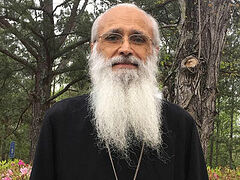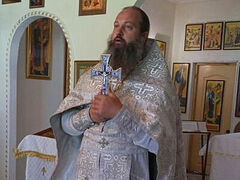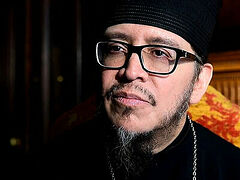 Priest Francisco Salvador with parishioners
Priest Francisco Salvador with parishioners
Having learned of my plan to visit Chile, Priest Francisco Salvador replied very benevolently: “Please come. If you need our help, we will definitely help you.” When I asked him to give an interview, he also reacted favorably, inviting me to give a lecture at the Institute of Orthodox Theology in Santiago. In my lecture I spoke about Orthodoxy in Europe (based on my numerous European interviews). Fr. Francisco and I talked after my lecture. The priest kindly treated me to coffee and sandwiches, regretting that he could not accompany me to lunch—that day a funeral service for one of his parishioners was scheduled.
 Santiago, the capital of Chile
Santiago, the capital of Chile
I stayed in Chile only a little—for two days—I managed to come to this South American country on the Pacific coast from Buenos Aires (Argentina), where I attended a scholarly conference. Santiago left an impression of a rather chaotic metropolis, but the city’s location at the foot of the Andes added an undeniable flavor to it that unfortunately Belarusian cities lack, because flat terrain is dominant in my native Belarus. The Orthodox Church of the Nativity of the Most Holy Theotokos (the Patriarchate of Antioch), the rector of which is Priest Francisco Salvador, is located on Pedro de Valdivia Street (the Providencia district) in the northeastern part of the Chilean capital. The position of the church as a free-standing building makes it clearly visible.
Fr. Francisco, who was born into an Orthodox family, was baptized Catholic—not at the desire of his parents, but due to certain circumstances. Of course, later he attended an Orthodox church. His desire to serve in God’s altar appeared during a trip to Russia in the early 1990s.
 Priest Francisco Salvador shows his grandfather’s wooden box with some Palestinian earth. Photo: Thomas Munita
Priest Francisco Salvador shows his grandfather’s wooden box with some Palestinian earth. Photo: Thomas Munita
—My distant ancestors came to Chile from Palestine over 100 years ago, fleeing from the persecution of Christians in the Ottoman Empire,” Fr. Francisco said. “They took part in the construction of St. George’s Orthodox Cathedral in Santiago (1917)—it was the first Orthodox church in Chile. My father, a successful businessman, worried about the future of Orthodoxy, since virtually all services at St. George’s Cathedral were in Arabic—a diaspora mentality prevailed. Thus, my father and his brother invested their money in the purchase of a building in Providencia (in 1977), which later became the Orthodox church where I serve.
—I was born very weak and when I was forty days old I was dying. The doctors said I was really going to die. At that time a Catholic priest was visiting the hospital, and my mother asked him to baptize me. There was no other way out. She prayed to God, asking Him to save my life if it was His will and if my life would have a meaning. I think my priesthood turned out to be the worthy reason, the meaning for which God saved my life in infancy. I attended an Orthodox church regularly, and after school I enrolled in law school.
—But you didn’t work in the sphere of law, did you?
—No, I didn’t. my life changed dramatically in 1992, when I visited Russia with a group of Chileans at the invitation of Patriarch Alexei II. And at the relics of St. John of Kronstadt in St. Petersburg I started weeping. I had never wept before, but here, at the saint’s tomb, I couldn’t stop crying. There was such happiness and joy in my heart that all this changed my outlook on life, the content of my life. I saw the relics of martyrs in Russia and realized that my secular career, even if I became rich and famous, did not matter at all. On returning to Chile I gave up my studies in the field of law, and then, after getting married, I went to study at St. Vladimir’s Seminary in New York.
Parish ministry
After receiving his theological education in the USA, Francisco returned to Chile and in 2000 was ordained a priest. Since that time, for over twenty-three years, he has served at the Church of the Nativity of the Theotokos in Santiago. According to Fr. Francisco, the parish has changed dramatically over this time—largely thanks to the vision of church services that Fr. Francisco formed.
“They used to worship in Arabic here with a little Greek,” Fr. Francisco relates. “But we decided to make our parish more open to locals, to Chileans. The services have been translated into Spanish, and now almost all our services are in Spanish. We abandoned the diaspora approach; we began to speak to people in a language that they understand well, in the context of the cultural tradition that has already been formed in Chile. The parish has grown, and now eighty percent of our parishioners are Chileans.”
As Fr. Francisco noted, he does not share the idea (which is popular in ecumenical circles) that the Orthodox and the Catholics have only “minor” differences.
—Why should a Catholic convert to Orthodoxy if his Church differs from ours only “a little”? But, on the contrary, we emphasize that the Orthodox Church is the Church that dates back to the time of the Apostles: it is the only Church that has preserved the integrity and fullness of the faith. And this is bearing fruit. People come to us, become interested in our faith, study it and often embrace Orthodoxy. There are famous and influential Chileans among them. For example, last summer Johannes Kaiser, a well-known far-right politician in Chile, converted to Orthodoxy… I do not support those Orthodox who are trying to introduce Catholic traditions in their parishes. For instance, some give first Communion to children at the age of twelve in a solemn atmosphere, as Catholics do. What for? Orthodox should receive Communion from infancy—this is the Orthodox tradition. Or why should Orthodox priests dress like Roman Catholics, as sometimes happens? I don’t see any sense in it; rather, I see only harm.
—Especially in a situation when Catholics are apparently losing their parishioners?
—The influence of the Catholic Church in our country has been undermined for several reasons. Firstly, the impact of secular ideology, which results in society becoming less religious. Secondly, numerous cases of pedophilia among Catholic clergy (and this is terrible!). Thirdly, people feel the alienation of the Catholic clergy from their flock. Catholic parishioners say that their priests even preach in a detached manner, talking about some abstract theological matters. As for us, we try to talk about the relevant, pressing issues, about what worries Chileans, our parishioners—ordinary people.
The parish mission
 Priest Francisco Salvador According to Fr. Francisco, several aspects are intertwined in missionary activity of the parish: the work of the Institute of Orthodox Theology, the position of the church, along with the activity on the internet. Each of these aspects has its own significance, but it was the activity on the net that has enabled a significant number of Chileans to learn about Orthodoxy.
Priest Francisco Salvador According to Fr. Francisco, several aspects are intertwined in missionary activity of the parish: the work of the Institute of Orthodox Theology, the position of the church, along with the activity on the internet. Each of these aspects has its own significance, but it was the activity on the net that has enabled a significant number of Chileans to learn about Orthodoxy.
—The church is clearly visible on our street, so people come here every day to learn more about Orthodoxy,” Fr. Francisco says. “At the Institute we organize courses for those who study the Orthodox faith. Many materials are posted online. We started working on the net actively in 2020, when the COVID-19 epidemic broke out. I work in this field with my eldest son Francisco.
 Priest Francisco Salvador with his eldest son Francisco junior joined our talk:
Priest Francisco Salvador with his eldest son Francisco junior joined our talk:
“Now we are the main Spanish-speaking Orthodox online channel,” Francisco emphasizes.
—We broadcast the Liturgy regularly: there are eight cameras installed in the church to broadcast services. Every week we post four or five new videos on our channel. For example, we post recordings of classes and lectures that we hold. We do all the work together with Father Francisco. I work in social media. And we really see results from our work—people are interested in Orthodoxy and are coming to us. If we sum up our online work, we have about 20,000 subscribers.
“I must say that we have considerably changed our work with those who want to convert to Orthodoxy,” Fr. Francisco says.
—Previously, if a person expressed such a desire, we would answer him: “Okay, keep coming to our services, and we’ll see in a year.” Now we say: “You are expected to come to the Liturgy every Sunday, get acquainted with the literature (or the videos), and work to help those in need. For example, to be involved in cooking for the poor (we have a kitchen where we cook every day) or other kinds of work to help those in need.” I would also like to note that now thanks to our work on the net, people come to us more prepared. They know about us, they know about Orthodoxy. True, there are sometimes odd situations when Catholics or Protestants come to take Communion—this is largely explained by the fact that some Orthodox parishes give Communion to heterodox—but this shouldn’t happen. It is painful to see that some Orthodox know almost nothing about confession. To remedy the situation, I hear confessions twice a week from morning to evening, giving people the opportunity to confess their sins the way they feel comfortable.
—What books do you usually recommend to Chileans interested in Orthodoxy?
—First of all, The Orthodox Faith by Protopresbyter Thomas Hopko. By the way, he was my father-confessor at St. Vladimir’s Seminary. The book has been translated into Spanish. We have also prepared a book about the Orthodox Church—it is small and suitable for our parish. We also have other publications—translations and compilations. We have worked out a special system for accepting new people: which books to recommend to them, what social work to involve them in. So many people are coming to us wishing to become Orthodox that the need for such a systematic approach has become evident.
“Every week they threaten to kill me”
“Chilean society has changed a great deal over the past twenty years,” Fr. Francisco says. “Now we live in a country where God’s blessing is almost entirely absent.
—Various leftist movements, Marxists and anarchists feel at ease here and do whatever they like. For example, in 2019, a wave of pogroms swept across the country—anarchists smashed up shops, metro stations and offices. Churches were set on fire, and the police were inactive. We then organized a round-the-clock watch in our church to prevent arson. We became the only church in the country whose parishioners stood up for it despite threats to maim us or kill us. All the windows were broken, the church was pelted with stones, they tried to set fire to it twice, but we did not allow them to burn it down. An amazing thing—dozens of young people were ready to become martyrs and die for Christ. That’s what they told me: ‘Father, we will be glad to become martyrs for Christ.’ What a contrast it was to the Catholics! The Catholic clergy of the churches in Santiago that were burned did not even dare condemn the anarchists and the Communists.
“I speak openly about things in society that I regard as unacceptable,” Fr. Francisco remarks.
—For example, last summer three policemen were murdered in a week. An unprecedented thing! This had never happened in the country before. I prepared a special video message in which I criticized the situation in the country and the actions of the authorities. I am not afraid to speak directly and openly. Many non–Orthodox—Catholics and Protestants—who watched my video, said that they would like their priests to be able to speak just as sincerely and openly... If something important occurs, we record a video and post it online. I think we are the only church in Chile that speaks about negative events concerning many, but which alas, are often ignored. This also attracts people to us who are tired of the indifference and the suppression of the facts.
 Church of the Nativity of the Theotokos in Santiago
Church of the Nativity of the Theotokos in Santiago
According to Fr Francisco, the hatred of the ultra-leftist radicals for the Church is very great; vandals smash windows, leave offensive graffiti on the church walls, and the priest receives death threats regularly.
“I ignore threats: after all, no one promised us a serene life,” Fr. Francisco remarks. “Moreover, for us it is a confirmation that we are doing good. If the Church is persecuted, it means that it carries out its mission well.”
“In our schools children are taught terrible things”
During our talk I couldn’t help but touch on the subject of education—it interests me not only as an associate professor of a university, but also as a father with many children. Supporters of pseudo–freedom (that is, pernicious depravity) seek to infiltrate schools and kindergartens in order to infect children with destructive ideas about gender and similar things. Unfortunately, the “enlightenment” in some European countries has acquired a “Sodom and Gomorrah” connotation. What does the South American continent, which is far from Europe, suggest in this regard?
—Anti–Church ideology is being spread in public schools and kindergartens in Chile. Children are told about the “normality” of same-sex relationships, about sex change, etc. Imagine how it feels for six-and-seven-year-olds to hear all this! It ruins the soul. At the same time, everything Christian is prohibited—not only in schools, but even in offices, and crucifixes and icons are banned. A real war is going on here when people of traditional views defend their right to religious symbols in workplaces.
—But if the education system is so hostile to Christian values, is there a way to educate children in the Christian spirit?
—It’s very hard. Of course, there are Catholic schools in Chile, but they teach children to be Catholics, not Orthodox.
—Is it very hard to found an Orthodox school?
—I wouldn’t say that. We had the opportunity to open an Orthodox school, but unfortunately, our ruling hierarch refused. A few years ago the Minister of Education in Chile was an Orthodox Christian; he was willing to help us, but even in this case he did not meet with the understanding of the bishop. Unfortunately, these are all echoes of the diaspora mentality. It is sad that this mentality poisons our lives. I am a Chilean, and I love my country, but I can only be a true Orthodox when I live according to the Gospel, and not when I start talking about my Palestinian roots. First of all, we must be Orthodox, and our nationalities and ethnic origins are secondary; and of course, they should not hinder our mission in any way.






